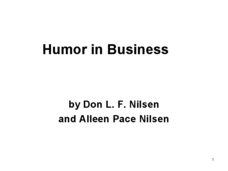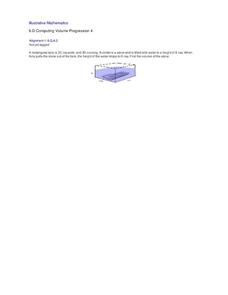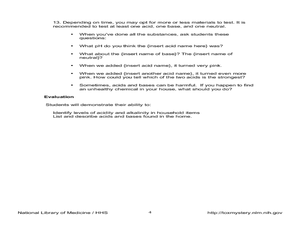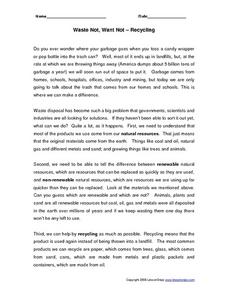Curated OER
Iron Fertilization - Pumping Iron
The theory that adding iron to ocean water may increase phytoplankton ability to remove carbon dioxide from the atmosphere is examined. The Monterey Bay Aquarium Research Institute is monitoring conditions off the California coast to...
Curated OER
Humor in Business and Advertising
Introduce your students to humor in the workplace with this thorough presentation, which provides numerous examples of why humor in business is beneficial - and even profitable. A good resource for a semantics class or beginning business...
Bridge
Mercury - Mercury is Rising
Hold a discussion in your class about the increase in mercury being found in fish that are caught commercially as food for humans. Given a worksheet, learners then calculate how much fish a person can safely eat each month to remain...
Curated OER
Understanding Character
Readers practice character analysis by reviewing Gary Soto's short story "La Bamba" with the whole class (anything you've read together will work). They design t-shirts that feature traits and story elements to reveal the nature of a...
Curated OER
Matter And Materials
Students investigate the concept of identifying different objects in nature and classifying them into different categories. The students will describe and explain a group of the objects orally and in writing form that is appropriate to...
Illustrative Mathematics
Comparing Rational and Irrational Number
Algebra learners must know how to use rational numbers to approximate irrationals. This resource asks participants to decide which number is larger without using a calculator. It makes a great exercise to use as a five-minute transition...
Illustrative Mathematics
Computing Volume Progression 4
This resource was written for the younger math learner, but finding the volume of an irregular solid is also a problem for algebra and geometry students. Based on Archimedes’ Principle, one can calculate the volume of a stone by...
Curated OER
Project Based Technology in Second Grade
The many activities in this resource serve to introduce second graders to the Macintosh computer and to various programs and their creative product options. They make sideshows using KidPix, practice using email with the Journey South...
Curated OER
A Pre-Treatment Model for Ethanol Production Using a Colorimetric Analysis of Starch Solutions
High schoolers recognize the benefits of ethanol and study photosynthesis. In this ethanol lesson students complete an experiment that shows the procedure that starch can be hydrolyzed by salivary amylase.
Curated OER
Workers in Factories During the Gilded Age
Seventh graders experience what life was like in the factories during the Gilded Age. They explore the reasons behind the move for work place reforms during the Progressive Era. Students discuss the factors that led to work place reforms.
Curated OER
In Search of Reused and Recycled
Learners identify recycled and recyclable products by reading labels. They discuss what happens to solid waste in landfills and its impact on the environment. They discuss ways in which they can conserve natural resources.
Curated OER
Class Conservation Corps (CCC)
Students investigate how the loss of soil, a valuable natural resource, affects their lives through loss of productive land to grow food, loss of coastal land mass, and poor water quality from runoff. They design a project to keep soil...
Curated OER
Sharkland Wiki
Students, while researching the waters around southern Africa and viewing a video of the episode "Sharkland" from Thirteen's series NATURE, critique reliability of online resources and analyze the various components of a wiki. They...
Curated OER
TRADERS' GAME
Students play a game aimed at demonstrating how relationships with other communities or countries affect the food and fiber system. The game simulates the unequal distribution of natural resources which creates the need for...
Curated OER
Acid or Base? Toxie's on the Case
Students recognize the difference between acids and bases. In this ToxMystery lesson, students play a computer game and experiment to find the difference between acids and bases. Students use litmus paper to determine if household...
Curated OER
Waste Not, Want Not – Recycling
In this recycling worksheet, 5th graders read a selection about recycling, renewable, and non-renewable resources. They answer 6 questions based on the reading by defining words, separating trash into renewable and non-renewable...
Curated OER
Where is Agriculture?
Students explore agriculture. In this agriculture instructional activity, students read "Where is Agriculture?" and discuss all the things that come from agriculture. Students discuss what they need to survive and give examples of...
Curated OER
Graze Like a Cow
Learners explore how a cow digests the grass they eat. In this science/math lesson, students compare the quality of forage. Additionally, learners determine the effects of rangeland health on the production.
Curated OER
Cycling Energy
Fourth graders are introduced to how electricity is produced. In groups, they compare and contrast the linear production of energy with other forms of mechanical energy production. They try to make a turbine work acting like it is part...
Curated OER
The Trail of a Snack Food
High schoolers identify some of their favorite snack foods. Using this information, they discover the resources needed to produce the food. In groups, they research different alternatives to make their favorite food in order to protect...
Curated OER
Searching For Power
Fourth graders explore different forms of energy and discover ways that natural resources are important. They research how your town would be affected by building your type of power plant.
Curated OER
Northern Neighbors
Fourth graders research a province in Canada in order to compare and contrast Canada to our country. They create a HyperStudio production to display their findings.
Curated OER
A Natural Connection to the Azores
Students use primary sources to examine whaling voyages, biology, and geography. In this geography lesson, students analyze ship logs and plot locations of animals and determine routes using latitude and longitude.
Curated OER
A Question of Style: Exploring the Nature of Shakespeare's Comedy
Young scholars present scenes from As You Like It and critique presentations of their peers. In this As You Like It lesson, students stage the opening scene, experimenting with different approaches to find the tone and style they think...

























